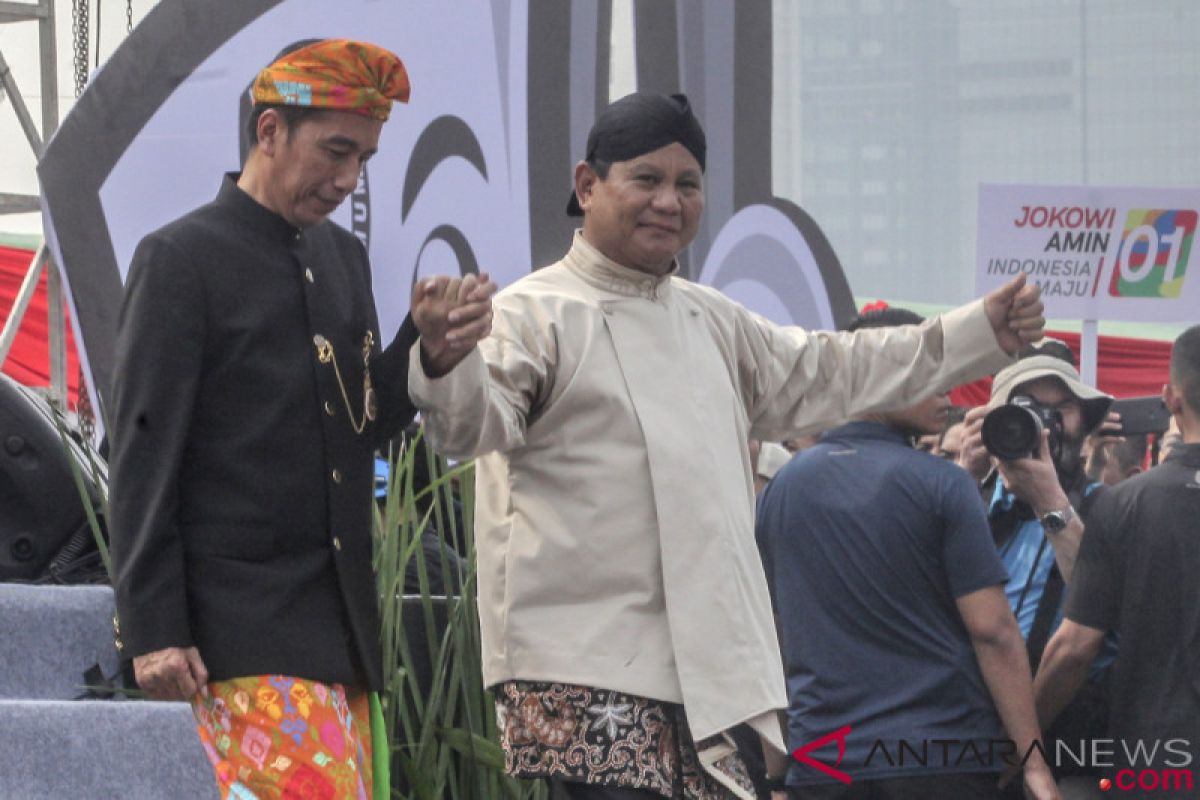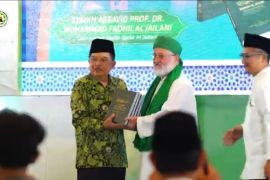The campaign period will last until April 13, 2019, for the presidential and legislative elections next year.
The pledge to hold peaceful elections was declared by presidential hopefuls and their pairs, coalition parties` leaders, as well as legislative candidates simultaneously across Indonesia.
Presidential and legislative elections will be organized directly, democratically, and simultaneously across Indonesia on April 17, 2019, which will be the fourth so far. Indonesia had, in fact, held its first elections since 1955, but it was not direct elections.
Next year`s race will be a re-run of the bitter 2014 presidential election that showcased the country`s divide, as Jokowi went head to head with Subianto.
In the direct presidential election five years ago, Joko Widodo (Jokowi) and his running mate Jusuf Kalla had won 70,997,833 votes, or 53.15 percent of the total 133,574,277 valid votes, while their rivals Subianto-Hatta Rajasa secured 62,576,444 votes, or 46.85 percent.
Jokowi has picked prominent ulema Ma`ruf Amin as his pair, while Prabowo Subianto has chosen successful and young businessman Sandiaga Uno as his running mate.
Jokowi, a cadre of the Indonesian Democratic Party of Struggle, is supported by party coalition called the Working Indonesia Coalition comprising the Muslim-based United Development Party, Golkar Party, National Awakening Party, National Democratic Party, People`s Conscience Party, Indonesian Justice and Unity Party, United Indonesia Party, and Indonesian Solidarity Party.
Called the Just and Prosperous Coalition, political parties supporting Subianto are the Gerindra Party, Prosperous Justice Party (PKS), National Mandate Party (PAN), and Democratic Party (PD).
Some 185 million eligible voters are expected to participate in the elections. The KPU has received the final official voter list (DPT) from the Home Affairs Ministry based on the data of electronic identity cards of the Indonesian people.
However, the DPT is currently being sorted and re-checked following findings on duplicate voter names in the list.
Subianto`s coalition claimed to have still found 8.1 million duplicate voter names in the DPT while sorting the list.
"We have sorted 185 million voter names in DPT, and 8,145,713 names in the list are duplicates, Pipin Sopian, the PKS chairman, revealed recently.
He stated that the coalition had earlier found some 25 million duplicate voter names in the Temporary Voter List (DPS) on July 13, 2018.
On September 5, 2018, the coalition received the DPT, approved by KPU, and still found 8,145,713 duplicate names out of some 185 million eligible voter names in the list.
Yandi Susanto, the PAN chairman, noted that the coalition had urged the KPU to ensure that the final list contained no duplicate voter names.
Following the findings, House Speaker Bambang Soesatyo has urged the KPU to address the problems of duplicate voter names in the DPT.
"The KPU must continue to update the data, so the DPT for the 2019 general elections would be clean and valid," the house speaker noted in a statement here on Thursday.
Invalid data is prone to abuse and misuse in general elections, he added.
He also called on the Commission to announce results of its verification and update to the public to prevent any suspicion and abuse of the voting rights.
Earlier, the Election Supervisory Agency had found duplicate voter names among 10,798 names in Batam, 8,862 in Tasikmalaya, 6,777 in Banyumas, and 1,036 in Purwakarta.
The KPU is currently sorting and correcting the DPT for a period of 60 days, or up to December 2018.
Chairman of KPU Arief Budiman highlighted the need for the extension, as the KPU not only traces duplicate voter names but also updates other matters, such as voters` address changes and eligible voters, who had passed away.
Deputy House Speaker Fadli Zon, who is from Gerindra, said the DPT is crucial for presidential and legislative elections next year, so 2019 should not be marred by DPT issues.
DPT could be an entry point for fraud in the elections, and the quality of democracy is measured through the DPT, he noted.
He also urged for a forensic audit of the KPU`s information technology (IT).
The results of the IT forensic audit should be made accessible to the respective teams of both presidential candidates.
The KPU should recruit cybersecurity experts from various universities in Indonesia to prevent KPU`s cyber system from being hacked or penetrated by outsiders, he added.
His statement was backed by a statement of the National Cyber and Encryption Agency (BSSN) saying that several potential cyber threats lie ahead of the 2019 presidential and legislative elections.
"There are plenty of them. Yes, you can see on the media. It will be too many if I have to mention them," BSSN Chairman Djoko Setiadi informed the media recently.
The agency will work together with every institution, with cybersecurity capability, to ensure that the presidential and legislative election will be held safely and smoothly.
Editing by Bustanuddin
Reporter: Fardah Assegaf
Editor: Heru Purwanto
Copyright © ANTARA 2018












